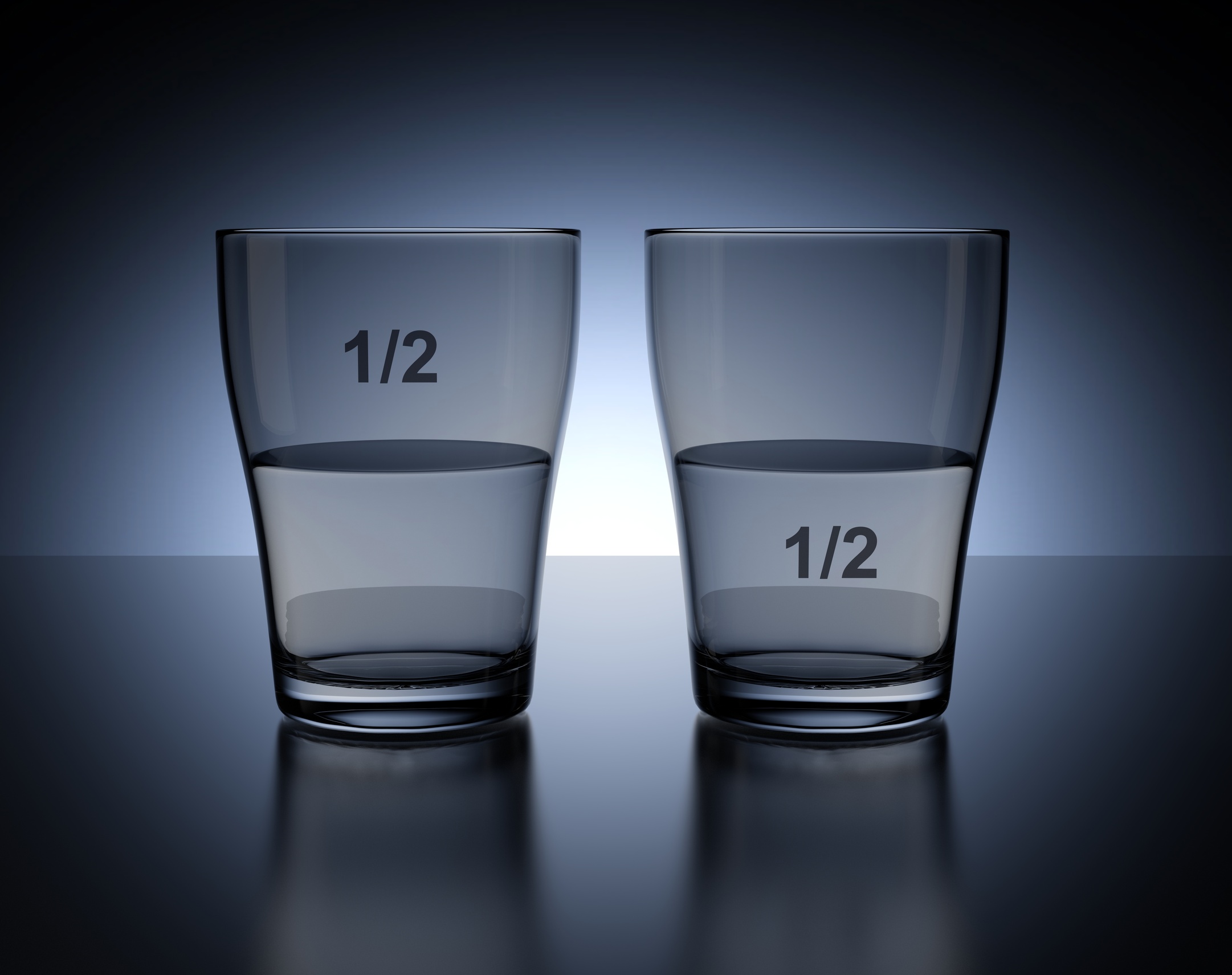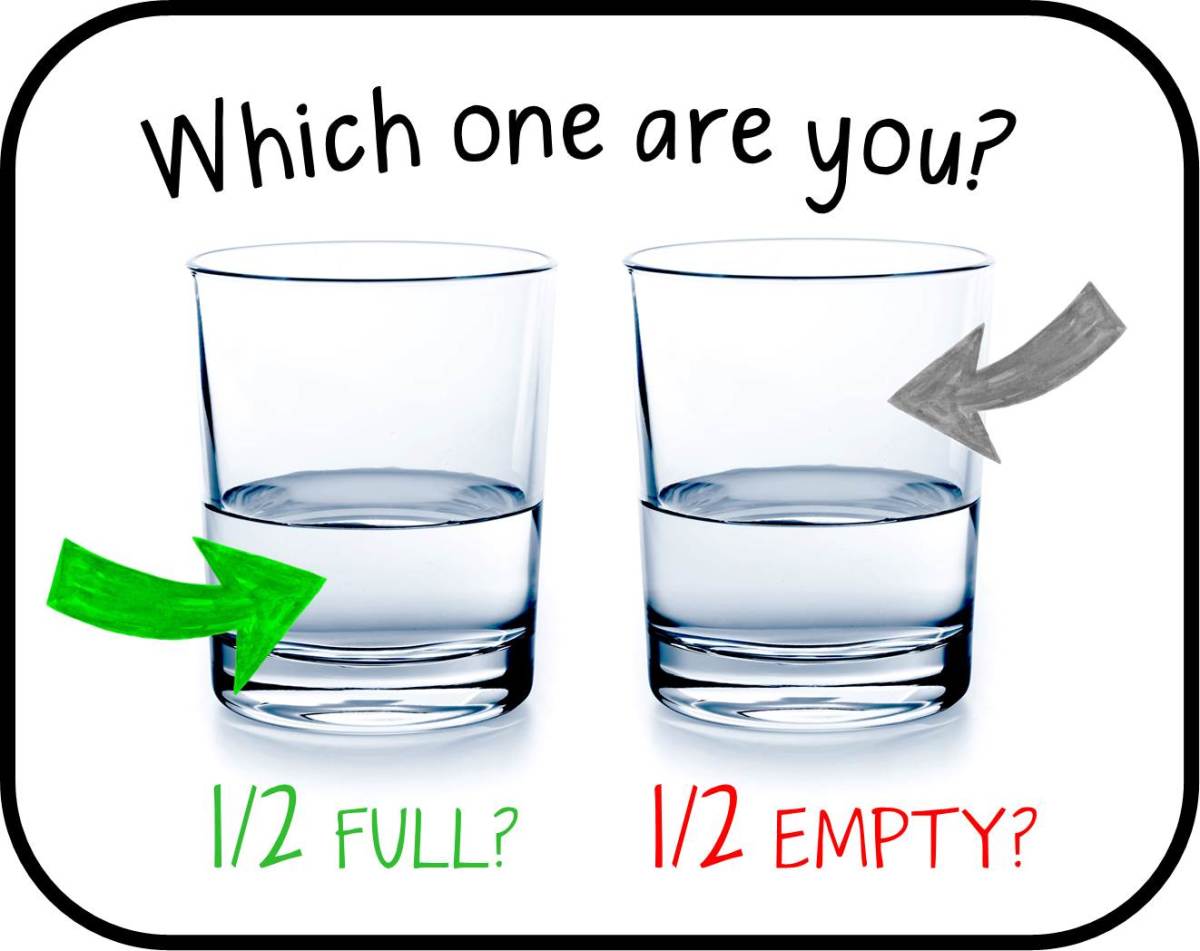The Glass Half Full - What It Really Means
That old saying about the glass being half full or half empty, it pops up just about everywhere, doesn't it? People often use it to talk about how someone looks at things, like whether they see the bright side or the gloomy side. It’s a simple picture, yet it holds a lot of different ideas about how we think and feel about what is happening around us. So, too it's almost a way we label folks, you know, as either hopeful or a bit down in the mouth.
But, is that all there is to it, really? This common phrase, which many people use to describe someone’s general outlook, actually has more layers to it than just a quick judgment. There are some interesting quirks and different ways people talk about 'half' things, which might just surprise you. It turns out, how you say something can really change what it means, or so it seems.
We often just accept these sayings without thinking much about them, yet when you pull them apart a little, they reveal quite a bit about how we use words and how our minds work. This idea of the glass, whether it is showing a hopeful picture or a less cheerful one, has some funny twists when you look at it closely. So, let’s unpack some of these thoughts and see what comes out.
Table of Contents
- What Does "Glass Half Full" Truly Suggest?
- Is It About Filling or Emptying Your Glass Half Full?
- How Does Language Shape Our View of the Glass Half Full?
- Can You Feel "Half Dead" - Or Is It Like the Glass Half Full?
- When Does Assuming the Best Become a Problem?
- What's the Real Takeaway From the Glass Half Full Idea?
- The Glass Half Full - A Look at Different Views
What Does "Glass Half Full" Truly Suggest?
When someone mentions a glass being half filled or half emptied, it really depends on what action is taking place, doesn't it? If you are in the middle of pouring liquid into the container, then it would seem like it is becoming full. On the other hand, if you are drinking from it or pouring liquid out, then it would appear to be getting empty. This simple observation points to how our current activity can frame our perception of the situation, in a way. It’s not just about the static amount, but the dynamic process that gives it its meaning, or so it seems.
There's also a chance for things to get mixed up when we talk about 'half' in different ways. For instance, in British English, a lot of people use 'half' before an hour to mean 'half past' that hour. You might hear someone say 'half four' and they mean it's thirty minutes after four o'clock. This can be a bit confusing for those not used to it, you know, as it’s a specific way of speaking about time. It just goes to show how language can have its own particular quirks depending on where you are.
It's perhaps worth adding that in German, the way they talk about time with 'half' is a bit different too. They might say 'halb fünf' which literally means 'half five' but they are talking about half past four, or almost five. So, it's really quite fascinating how different tongues handle the same simple concept of 'half' in such varied ways. This makes the idea of the glass half full even more interesting when you think about how language shapes our general thoughts.
- Bobbi Althoff
- Sophie Rain Spider Man Video
- Amariah Morales
- Cast Of Despicable Me 4
- Sophie Rain Spiderman Video Tutorial
Is It About Filling or Emptying Your Glass Half Full?
Imagine you asked for a glass that was half empty, perhaps because you wanted to put the same amount of orange juice into it. If someone brought you a glass of water that looked more than half empty, but then you realized it was nearly full, that could be a bit of a head-scratcher, couldn't it? The way we describe the amount can be very misleading depending on our starting point or what we expect. It's almost like a trick of the eye, really.
So, no, there doesn't appear to be one single word that describes this whole phenomenon of the glass being both more than half empty and nearly full at the same time. It's a bit of a linguistic puzzle, you know. This kind of situation shows how our everyday language sometimes struggles to perfectly capture a complex reality with just one simple term. We often rely on context to make sense of these kinds of statements, or so it seems.
These phrases, 'half full' and 'half empty', are sometimes called nonsense phrases by some people. They argue that a glass might be far from full or far from empty, or it might be nearly full or nearly empty. It might just contain about half as much as it would if it were completely full. This perspective suggests that the phrases themselves aren't precise enough to convey the actual state of affairs, or so they say. It's an interesting point to consider, anyway.
How Does Language Shape Our View of the Glass Half Full?
It's similar to the glass half full or half empty situation when you think about it. It truly depends on how you look at that kind of circumstance, whether you are feeling hopeful or a bit gloomy. This is where the common understanding of the phrase truly comes into play, connecting it directly to a person's general outlook on life. It's really about the perspective you choose to adopt, isn't it?
We say things like 'half a dozen' for six items, and we don't usually say 'half of a dozen'. Similarly, we talk about 'half an hour' for thirty minutes, not 'half of an hour'. In these ways of speaking, the word 'half' acts like a descriptor, just like it does in other sentences where it describes a quantity. It’s a very common way we use language, you know, to express portions without needing extra words. This shows how 'half' can function as a simple adjective, which is quite interesting.
The words 'half' and '½' mean the same thing, so the choice between using one or the other is mostly about how you want it to look, not about whether it is grammatically right or wrong. Just like some style guides for writing will suggest spelling out numbers rather than using symbols, the choice often comes down to what looks best in a particular piece of writing. It's purely a matter of preference, really, and not about a deeper meaning, or so it seems.
When we talk about time and thirty minutes has gone past an hour, we say 'half past'. For instance, you might say 'half past four' or 'half past five'. But why can't we also say 'half to'? For instance, 'half to five' to mean thirty minutes before five o'clock? This practice still isn't satisfying to some people, as in the general sense, a glass of water being 'more than half empty' is easily understood as that glass of water is more empty than it is half. It's a bit of a puzzle, this language thing, isn't it?
Can You Feel "Half Dead" - Or Is It Like the Glass Half Full?
Consider the idea of being 'half dead'. Some people might say that a person is either alive or they are not, right? They are either completely alive, or they are not alive at all. So, being 'half dead' might not make any sense in a very strict, literal way. It's a bit of a strange expression when you think about it, anyway, and it makes you wonder where this oddly precise phrase came from in the first place.
However, it is possible to feel 'half dead' in a different sense. For example, a sparse collection is a collection that has few members out of a large possible number of members. An empty collection has no members, and a dense collection has many members. So yes, it is possible to feel 'half dead' in a way that suggests a state of being extremely tired or drained, rather than literally being between life and death. It's really about how you interpret the words, isn't it?
The way to truly get a handle on this deeper sense of feeling 'half dead', or any similar expression, is to get to know yourself better and explore these subjects more deeply. If a direct search for a literal meaning is what you are looking for, you might miss the more personal, felt experience of such a state. It's very much down to how you make sense of things and your own personal viewpoint, just like with the glass half full or half empty idea.
When Does Assuming the Best Become a Problem?
Assuming the best in people is usually a good thing, you know, a hopeful way to approach others. It can help build trust and create more pleasant interactions. However, it becomes a less helpful thing when that hopeful belief is shown to be not true, and yet someone still holds onto it very stubbornly. This kind of sticking to a belief, even when faced with proof against it, can lead to difficulties. It's really about being realistic, isn't it?
On a more serious note, this kind of stubborn clinging to an unwarranted belief can be a sign of someone who tends to complain a lot. These people often find fault with nearly everything, including even the weather. They usually see the world in a less than cheerful way, which is why they might be described as a 'glass half empty' sort of person. It's a pattern of thinking that can be quite noticeable, anyway, in how they talk about their experiences.
What's the Real Takeaway From the Glass Half Full Idea?
Someone who sees the world in a less cheerful way is often called a 'glass half empty' person. On the flip side, someone who is generally hopeful is often called a 'glass half full' person. It's a simple way to label these two very different outlooks. It's quite bizarre, actually, that a well-known information source like Wikipedia doesn't have an entry for this common saying, considering how often it is used in everyday conversation. It just goes to show that some things are so ingrained in our culture, they might not even be formally documented, or so it seems.
The Glass Half Full - A Look at Different Views
So, we've explored how the idea of the glass, whether it is showing a hopeful picture or a less cheerful one, isn't just about a simple observation. It touches on how we use language, how we perceive things based on what we are doing, and even how we describe complex feelings. It's about personal viewpoints and the nuances of words, too it's almost a way to understand how different minds work. This common saying, it turns out, has a lot more going on beneath the surface than you might first think, anyway.
/half-full-and-empty-157672090-57a8f6553df78cf45952581a.jpg)
Is Your Glass Half Empty or Half Full?

Glass Half Empty or Half Full: It’s All A Matter of Perspective

Is Your Glass Half Full or Half Empty? - RemedyGrove